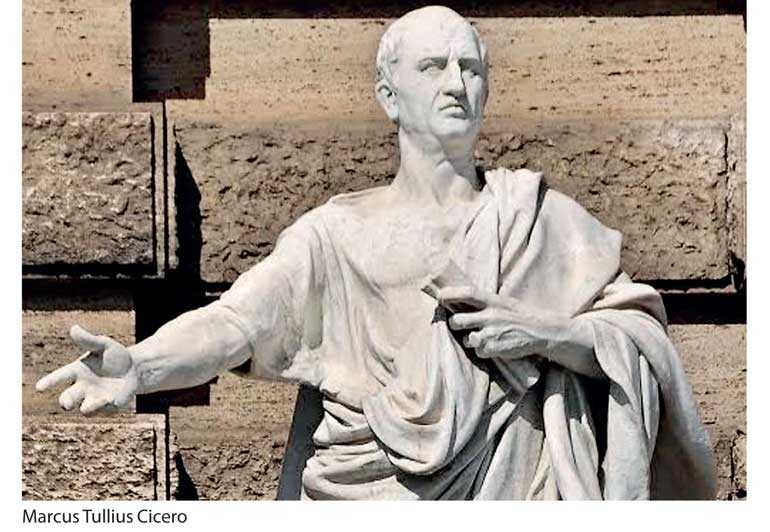Thursday Feb 19, 2026
Thursday Feb 19, 2026
Friday, 20 April 2018 00:00 - - {{hitsCtrl.values.hits}}
 By Sunirma Opatha
By Sunirma Opatha
History reminds us that even though the human circumstances change with the advances of science and technology, core human emotions and passions remain the same. As a result humans tend to do repeat mistakes of their ancestors.
If the latter argument holds, there is little difference between second century B.C. Rome and the modern world. The speeches of Cicero, one of the greatest orators the world has ever heard, provides insights into the values and ideals ancient Romans aspired to.
Marcus Tullius Cicero (106 BC –43 BC) was a Roman politician and a lawyer famous for his oratory. Among other things, he is known for enriching the Latin political vocabulary by introducing new expressions such as evidentia (evidence),humanitas (humanity), qualitas (quality), quantitas (quantity), and essential (essentiality), which are commonly used today and on which many philosophical arguments have since been based.
Among the many speeches that Cicero has delivered, the case against Verresis particularly known as it is also an attack against mass corruption then occurring in the provinces of Rome.
The supposed wisdom and the purity of the ancient world are too often glorified and romanticised thus shadowing the reality of that world. Human nature is complex and many sided. Our reality is a mix of both good and bad. We must not be lulled into believing that all was sweetness and light in eras gone by. Evil and vice existed side by side with the good and the virtuous in the ancient world as much as they do in today’s world.
The brutality of Roman Gladiator spectacles are highlighted while corruption of the contemporary politicians is often swept under the carpet. The Roman republic in the 1st century B.C. was one of the richest in the world. Conquests of neighbouring European countries enabled Rome to acquire great wealth and riches. But this wealth was never re-distributed among the poor.
While the poor became poorer, the aristocrats, senators and politicians became extremely rich through exploitation of the new lands that the Roman legions captured. Marcus Tullius Cicero was one of the few who stood up against the rampant corruption in the Rome of his day.
One of the best examples of Cicero’s campaign against corruption is his prosecution of Verres. Verres was an influential and a powerful political figure who was the governor of the Sicily, a large island off the coast of southern Italy which was the first province of Rome.
Cicero had found much evidence to declare that Verres was a highly corrupt politician involved in extortion, looting and even the murder of innocent Roman citizens. As the prosperity of Sicily grew due to it being located in the centre of the Mediterranean trade, Verres’ exploitation of the province also grew.
Cicero was not renowned for any battlefield successes, the standard pathway to glory then in Rome. He could therefore not fall back on military triumphs to go places. Cicero was the son of a knight (eques) and hence a ‘new man’ (homo novus), that is one without ancestors who were senators. Hence Cicero invested in a good education as a means to get ahead and make his way in society.
Due to him being a self-made man, a homo novus, who owed the established personalities no favours, Cicero was unafraid to take Verres on. Realising that Verres could delay proceedings using his influence, Cicero fell back on his strengths. He used his brilliant oratorical skills to present the solid evidence he had against Verres effectively on the very first day in court. Cicero’s forensic skills were so effective that Verres had to flee Sicily and live in exile for the rest of his life, the biggest punishment and shame that could befall a Roman at that time.
In addition to the solid evidence against Verres that he presented in court, Cicero made the telling point that punishment meted to a corrupt politician like Verres could re-establish the faith and trust that public has in the Senate or in the republic.
Cicero is a fine example of a prosecutor using evidence-based arguments. In his case the only strength he possessed against a powerful and corrupt politician was the concrete evidence that he had gathered. It may perhaps be impossible to find a Cicero in the world of today.
Corruption and the exploitation of public wealth today in Sri Lanka are as horrendous as in Cicero’s time in Rome. Whence will come a modern Cicero to help us cleanse our polluted society?
[The writer is a B.A. (hon) graduate in Greek and Roman Studies from University of Peradeniya.]